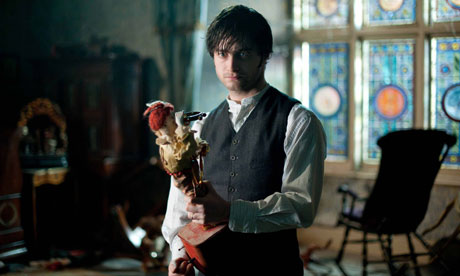
Penniless novelists may not weep for Susan Hill. The author of The Woman in Black claims she is "broke" despite the Daniel Radcliffe-led adaptation of her 1983 novel taking more than $US50m in the US and £20m in the UK. Hill's stage play of the same story has run in the West End for 23 years and the 69-year-old author of acclaimed novels such as A Bit of Singing and Dancing lives on a 50-acre farm in Gloucestershire and even has her own publishing imprint.
But she has a good point. "Films always make everyone else rich save the author," she tweeted to one of her followers. "Film accounting", she told another, is "very weird".
Hollywood needs authors. Five of the nine films nominated for best picture at this year's Oscars were adapted from novels, and one from a non-fiction book.
Big studios might be struggling without the imagination of Jonathan Safran Foer, Michael Morpurgo, Brian Selznick, Kathryn Stockett and Kaui Hart Hemmings but they do not seem to want to pay much for this precious commodity. There is even a phrase for it, "Hollywood accounting", describing the extremely creative practice of turning healthy film profits into losses to avoid royalty payments.
Winston Groom never received a penny despite reportedly agreeing to a 3% share of net profits for the hugely successful Forrest Gump; the novelist was so upset by this dispute he refused to sell film rights to the novel's sequel. JRR Tolkien's family accused New Line Cinema of insatiable greed and sued it for a reported £133m over its failure to distribute profits from the £1.8bn-grossing Lord of the Rings trilogy.
The Tolkien family's eventual settlement was confidential and Hill's deal for The Woman in Black is similarlyshrouded in commercial confidentiality although she tweeted it was "peanuts against 100 million plus".
"The stage play gives me a monthly income, yes, and broke is a relative term – of course I am not, as against people sleeping in the streets," she admits. "But cash flow for authors is a problem, as for all freelances, and the tax people demand huge amounts in advance of them being earned now – crazy but true. So although I have money to pay them, I haven't much over."
But for other authors it's a lifesaver. The film version of Benjamin Mee's We Bought A Zoo, released last week starring Matt Damon, saved Mee's zoo. He received £250,000 when the film went into production, but whether he receives his 5% share of the net profits (it has already grossed US$100m) may depend on his lawyers.
"The accounting is terrible," says literary agent Ed Victor, who represents everyone from Rupert Everett to Nigella Lawson. But he believes "there is no excuse for authors not making money from films". His client Max Brooks has just had World War Z made into a zombie thriller starring Brad Pitt. Film companies lavish more on marketing than 20 publishers combined says Victor, and Brooks's novel "will sell another million or more [copies] because of the film tie-in".
"It's always vexed," says Victor of the question of film rights. To which some might say, there's no pleasing these authors.
Film rights
What authors can expect
▶ A modest sum (£1,000 to £10,000) for the "option" to make the book into a film.
▶ Most optioned books never make it to screen but authors may receive more than one such payment if another film company comes in after the first option payment has expired.
▶ A payment when the film goes into production, usually between 2% and 3% of the film's budget.
▶ With some deals, an author also receives a percentage of the film's net profit. This sounds like a money-spinner but producers are adept at avoiding these payments.

